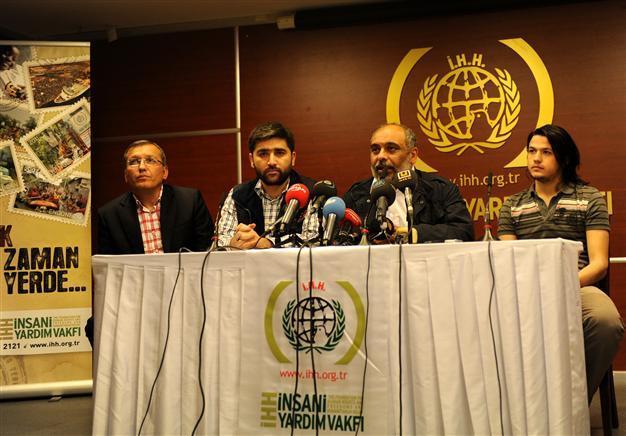Freed journalists tell of captivity in Syria
ISTANBUL

Turkish journalists, Özköse (L) and Coşkun (R), hold a press conference in Istanbul with the chairman of a local NGO, Yıldırım, shortly after their release from Syria. DAILY NEWS photo
Two Turkish journalists who went missing while reporting on the uprising in Syria two months ago were released on Saturday with the help of Iran, Foreign Minister Ahmet Davutoğlu has said.After two months in detention, Adem Özköse, 34, and Hamit Coşkun, 21, took a plane from Tehran that landed early May 13 in Istanbul, where they were greeted by friends and relatives.
Özköse, a reporter with Milat, a small Islamist-leaning startup newspaper, and freelance cameraman Coşkun, went missing on March 10 after sneaking across the border into the northwestern province of Idlib. They were not heard of until last weekend when they made brief telephone calls to their families from detention in Damascus.
Turkey currently has strained ties with Syria, which is trying to crush an anti-government uprising. Turkish officials had therefore asked Iran, a staunch backer of Syrian President Bashar al-Assad, to help in efforts to release the journalists.
The release of the pair demonstrated Iran’s influence with its ally Syria, which lost Turkey’s friendship when it cracked down on pro-democracy protests that erupted last year. Iran and Syria, both isolated by the West, have stuck by each other.
The two journalists were flown to Tehran, where they said they were in good health and looking forward to being reunited with their families.
Davutoğlu said the Turkish Republic stood by its citizens and would continue helping out its people anywhere in the world, speaking on May 12 in Moldova, where he was holding a series of meetings. After a question asking: “Why were the journalists not released over Hatay and rather released via Tehran?” Davutoğlu said: “We are experienced in these situations. In these situations, countries, especially neighboring ones, help each other and cooperate.”
He also mentioned the 11 Iranians who were sent to Iran over Turkey a couple of months ago, “it’s pointless to even discuss these, what is important here was how to send the Iranians safely and easily.”
For its part, Turkey has also helped release a number of Iranian pilgrims held captive by Syrian insurgents, according to Iranian media reports. Two of the Iranian pilgrims “kidnapped in northern Syria by an armed group” departed Istanbul for Tehran on May 12 evening, Irna news agency reported. Some 18 of them had been released earlier, while there are still seven of them being held captive in Syria.
Meanwhile, Iran’s ambassador to Ankara, Bahman Hosseinpour, confirmed media reports that two Iranian nationals had been released in Syria and were scheduled to be handed over to Iranian officials by Turkish authorities, in an interview with the Mehr news agency on May 12.
Davutoğlu said, “It is pleasing to see happy endings. I hope that both journalists get back into their routines as soon as possible. I would like to say to all our citizens that the Turkish Republic always stands by and will stand by its citizens in all corners of the world.” He also thanked the communities who had taken part in helping out and considering the situation.
In remarks on his Twitter account, Davutoğlu said the Turkish government was sending a plane to bring them home. His Iranian counterpart Ali Akbar Salehi had told him earlier that the journalists had been freed, he added. “I have good news: our longstanding efforts have finally paid off. I just spoke to Iran’s Foreign Minister Mr. Salehi. Hamit Coşkun and Adem Özköse, who haven’t been heard of since they went to Syria, are on their way to Tehran at the moment,” Davutoğlu said. Speaking to Anatolia news agency from Tehran, Özköse thanked fellow journalists for keeping their plight in the public eye. “We thank everybody who worked to save us, to all our colleagues we send our best regards,” Özköse was quoted as saying.
Özköse and Coşkun said they had been detained by pro-al-Assad forces and that they thought they would not be able to return to Turkey for years. Özköse said there had been “all kinds of trading - they wanted to exchange us for all sorts of things. It’s because of the negotiations and these meetings that the process took so long,” Agence France-Presse reported.
“They took us to a basement of a home. They tied our eyes and put handcuffs on our hands. Guns were pointed at us. They were talking about what to do with us. They mentioned killing us,” Özköse said, adding that they were not the victims of physical torture. He said the pro-al-Assad forces handed them over to the Syrian police on the ninth day of detainment. The pair could see each other only 52 days later in detainment. They said the soldiers took them from a police station to a military headquarters in Damascus. They were interrogated as to whether they were spies sent to collect information for a corridor into Syria, said Özköse.
“We realized that we were involved in the documentary of our own lives,” said Özköse, who had originally gone to Syria to shoot a documentary.
Welcoming the two journalists, Turkish Deputy Prime Minister Beşir Atalay said both had witnessed a humanitarian tragedy in Syria during their 65 days of deprivation.
Coşkun said they were pleased to be free. “Freedom is the best thing on earth. May God give freedom to all innocent people.”
Additional AP and Reuters stories from Ankara and Istanbul are included in this story.
















